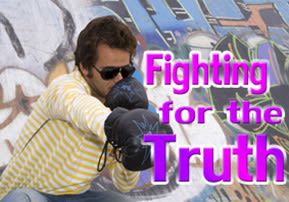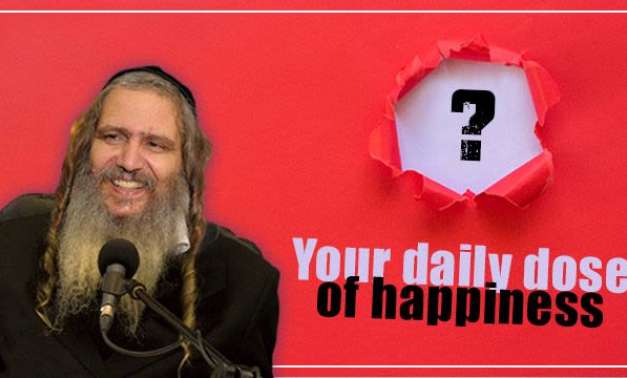
Fighting for the Truth
Once Adam sinned, he caused a concealment of emuna; for that reason, every subsequent generation and every person must wage a big war to live...

Guard and Remember
As long as one sees that he continues to slip, he should persevere in prayer until he succeeds in guarding his eyes and no longer fails.
Once a person has achieved the ability of guarding his eyes, he needs continued daily prayer to maintain what he has worked so hard for. Only incessant daily efforts will assure guarding one’s eyes completely, which means that one will be spared from uncountable transgressions, sins, and blemishes to his soul. By guarding one’s eyes, one earns the title of a tzaddik, earns emuna, merits an abundance of income and miraculous Divine providence, gains a holy insight into Torah, and benefits from many more blessings.
Why lose all this? A person that doesn’t believe in himself that the obligation of guarding one’s eyes is absolute Torah truth won’t fight to keep his eyes shut! If he’d believe in himself, he’d pray for this every day while clarifying the truth that looking at women is forbidden. He’d refuse to be tripped up in this area anymore. And if he did have a slip-up, he wouldn’t ignore it. Instead, he would simply evaluate himself, make teshuva, and continue praying.
What is Repeated Transgression?
Our sages say (tractate Yoma, 86), “Rav Huna said: Since a person transgressed and repeated the transgression, the forbidden deed becomes permissible in his mind.” Something forbidden appears to be permissible unless we work hard daily to avoid it. As long as we keep up the fight, pray, evaluate ourselves, and make daily teshuva, then even a periodic slip-up is part of our growth, and clearly the transgression doesn’t become permissible in our minds. If we make a mistake, we don’t ignore it. On the contrary, we strengthen ourselves in teshuva and in prayer until we no longer transgress.
On the other hand, if one lacks proper personal prayer, and he hasn’t clarified to himself that looking at women is forbidden, and it’s not yet clear to him that as long as he continues to transgress he must add more prayer, more teshuva, and more hard work, and he doesn’t work on his daily hitbodedut, then certainly the transgression will become permissible in his eyes. In other words, he won’t feel that there’s anything wrong with looking at women.
This is the true intent of our sages: Since a person transgresses and repeats the transgression, the forbidden deed becomes permissible in his mind – this is when there’s no teshuva between each transgression. But, if a person slips up, does teshuva in the meanwhile, and then slips up again, the next time he transgresses is not called a repeat, because the act of teshuva erased the former transgression. This is one of the magnificent virtues of hitbodedut.
Even if a person doesn’t succeed in observing what he knows is true, the important thing is that he knows what’s true, fights for it, and evaluates himself daily. This is an enormous encouragement for those who pray and work on themselves, yet continue to fall from time to time. Rather than losing heart, they should regard their setback as part of their service to Hashem and their spiritual growth, and not as a failure.
We can apply everything we said about guarding our eyes to any mitzvah in the Torah, to improving any character trait, or to ridding ourselves of any bad habit or bodily lust. Whenever we take a certain issue and invest repeated personal prayer until we clarify the crystal-clear truth in our own mind, Hashem certainly helps us accomplish what we desire to accomplish. This is the path of righteousness, and of becoming a complete tzaddik.
Don’t Go Away
Once Adam sinned, he caused a concealment of emuna; for that reason, every subsequent generation and every person must wage a big war to live according to emuna. Before man first sinned, emuna was crystal clear, and one could easily believe in Hashem. But since Adam made improper personal prayer, then an utterance escaped The King’s mouth – Hashem – that the “no-good one should take you,” and emuna, the princess, disappeared. Now, each of us has to work so hard to find emuna.
A person sins because he forgets Hashem, and turns his back on Hashem. Hashem responds in like manner, and turns His back on the sinner. Meanwhile, emuna becomes even more elusive. Each transgression that a person commits causes a deeper disappearance of emuna, making the search for emuna even more difficult. A person’s entire task in the world should be to rectify the disappearance of emuna that he caused with his own actions.
On the other hand, we can take heart by knowing that if a person has sinned, and emuna is concealed, yet the person reinforces himself and strives to search for emuna, then not only will he rectify everything, but he will bring the world and himself to a higher level than if he had never sinned at all, as long as his transgression wasn’t deliberate.
This is all the result of Hashem’s mercy, for Hashem sees that a person doesn’t willfully sin, yet his Yetzer overcomes and leads him astray. As such, Hashem gives us the gift of teshuva, and even rewards us by helping us turn our infamous past misdeeds into steppingstones of spiritual growth. Nevertheless, one should never willfully transgress in order to attain a teshuva-based tikkun afterwards. Our sages warned, “He who says, ‘I shall sin and then make teshuva,’ never has the chance to make teshuva.”
To be continued.









Tell us what you think!
Thank you for your comment!
It will be published after approval by the Editor.